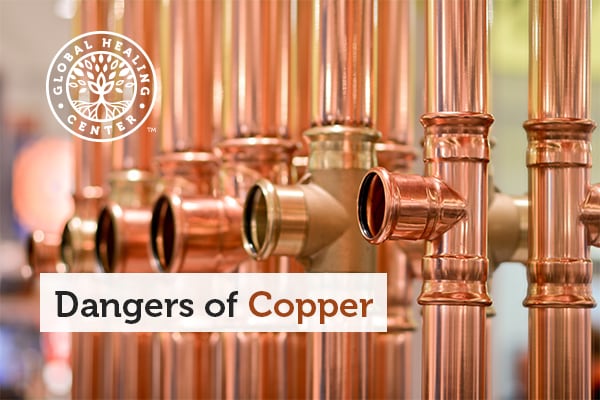
Copper is an elemental nutrient that is necessary for good health. In fact, it can be found naturally in all plants and animals. The metallic form of copper can also be found in our environment as it occurs naturally. As necessary as it is for your body to have a certain amount of copper, being exposed to too much copper can be detrimental to your health.
What is Copper?
Copper is a ductile metal that is found in nature. It is well recognized for its electrical conductivity. It makes a beautiful building material and is widely used in the construction and plumbing industries.
Besides a popular metal for sculpture, it was recently discovered that copper is a biocidal agent. Copper compounds are used for purposes like treating plants for mildew or as preservatives for leather, fabrics and wood.
How am I Exposed to Copper?
Like most toxic metals, we can be exposed to copper in the air we breathe, water we drink, or food we eat. Copper can enter the body through the skin. If your home has copper plumbing pipes, there is a chance that your drinking water may include a high level of copper. Many lakes and streams are treated with copper to help prevent overgrowth of algae. If you live near a copper smelting plant, there is a good chance your soil has a large amount of copper in it.
Individuals who work in copper mines or in a plant where copper is processed into brass or bronze are also at a high risk for exposure to dangerous levels of copper. Copper has also been found in 906 of the 1,647 National Priority Sites as determined by the Environmental Protection Agency.
What are the Symptoms of Copper Exposure?
The body needs trace amounts of copper in order to function properly. But too much exposure to copper can cause a number of health concerns. For instance, simply breathing in copper can cause irritation to your nose and throat. If you ingest copper orally, it may cause:
- Nausea
- Vomiting
- Diarrhea
- Liver Damage
- Kidney Damage
- Death
While the Environmental Protection Agency (EPA) has not yet classified copper as a carcinogen to humans, questions remain regarding its safety and long term effects in humans. It is not known at what levels copper exposure may affect births. In animals, copper exposure is believed to cause a decrease in fetal growth, but how it affects humans is still up for debate.
How does Copper Enter the Environment?
Copper may enter the environment naturally when vegetation decays, volcanoes erupt, forests burn, and so on. Additionally, man-made processes like mining, manufacturing and farming may also put copper into the environment. While copper compounds break down in the open environment, the pure copper particles do not break down and remain behind in our air, food and water.
How do I Test Myself for Copper?
Many medical laboratories can test for copper in the body but tests can not tell you how much copper you have in your body or what harmful effects, if any, you will experience.
†Results may vary. Information and statements made are for education purposes and are not intended to replace the advice of your doctor. If you have a severe medical condition or health concern, see your physician.







